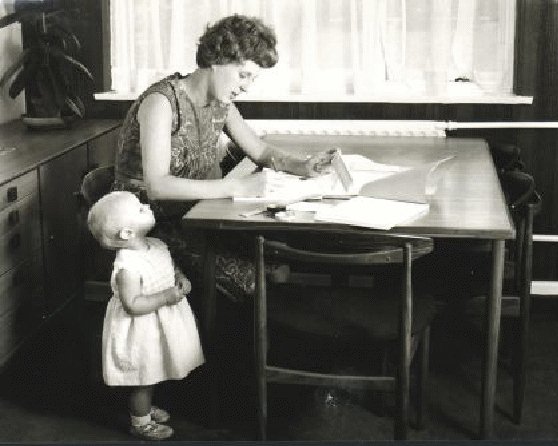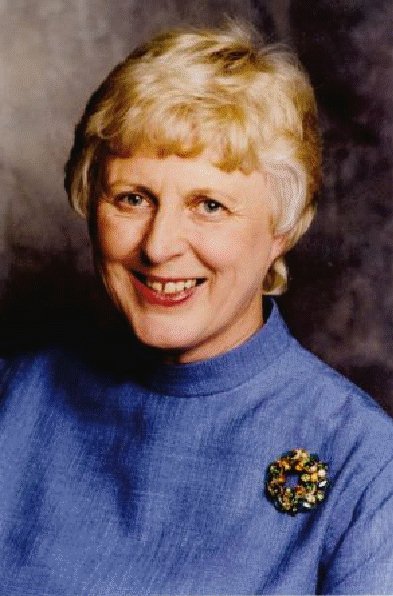

Ann Moffatt started work in the Information Technology Industry in 1959. She has professional experience at all levels including programmer, analyst, project manager, company manager and she has served on several company Boards. In 2012 Ann wrote the following anecdotes of her time with the Manchester Atlas, which covered the period from about mid 1962 to the end of 1962.
In 1962 I worked for Kodak UK Ltd., mainly with the Portland Place bit of Ferranti Ltd starting with Pegasus then Mercury then Orion. When Ferranti were having trouble getting the Atlas Supervisor going in 1962, several of the customers who were waiting urgently for it, such as Kodak and Royal Dutch Shell, went to Manchester and helped with the Supervisor wherever they could.
I was writing my application programs in Mercury Autocode. We had been told by Ferranti that this would run on Atlas without alteration, although there would eventually be new more powerful instructions in Atlas Autocode.
The problem we had in 1962 was that the Atlas Supervisor was not yet fully developed and the computer kept failing. We 'apps programmers' could only have access to the computer from 11pm to 6am. The engineers had the machine at other times.
I really only mixed with the programmers from other customers and the Ferranti office staff. We 'apps programmers' were asked if we would like to help iron out bugs in the Supervisor. We were given fairly detailed talks on how the Supervisor was supposed to work. I was given the drum 'learning' program to test and debug. Other 'customer programmers' took other bits to test and debug.
Here's what it felt like to be an applications programmer, travelling weekly from London to Manchester to start work on Atlas for the first time in mid-1962 and being the only female in a male-dominated environment. Martin (not his real name) was Ferranti's manager at Quay Street, Manchester.
On arrival at Manchester I went down into the foyer of the grand old 4 star British Railways Midland hotel. Martin was waiting and we took a taxi from those waiting outside the hotel to the Casa del Vino. Martin told me this was the best restaurant in Manchester and the place where most of the companies working on Atlas ate. He told me that as everyone was on expense accounts, each company took turn to 'entertain' the others. He looked around for other people who would be working on Atlas that night and muttered that they must have gone somewhere else to eat.
The food was excellent. As we chatted about the wonderment of Atlas and Martin drank more red wine, he seemed to get a hint of a twinkle in his eye. Over pudding he suddenly looked up abruptly, grabbed my hand across the table and spluttered an apology for keeping me waiting in reception that morning. "I was so looking forward to you coming up but when I saw you I just couldn't face you. You looked exactly like a girl I'd been going to marry. She jilted me 6 months ago."
I told Martin that I had had a similar shock when I had seen him. He looked exactly like a boss I had hated. The tension between us lifted.
"Now that we've got that over, we need to have some fun. There are lots of good night clubs in Manchester and more in Liverpool. What sort of music do you like? Jazz, good. Modern? Even better. We're going to have great fun" Martin said.
After dinner he took me to the University computer centre in Dover Street, about a mile to the south of the City centre. The place looked like a mad magician's workshop with wires snaking across the floor and backs of cabinets open to allow the engineers access to the inner workings of Atlas. It was very much an engineering research lab and nothing like the tidy, 'commercial' computer rooms I had been used to.
My days and weeks took on a fairly regular pattern. Fly to Manchester on the early plane on Monday morning and back home on the late plane on Friday afternoon. Work in the Ferranti Quay Street office from about 9am to 6pm. This comprised discussing the previous night's results and strategising new designs where old ones had proved unworkable then writing and checking new code ready for that night's tests. Back to Hotel to freshen up. Dinner at one of the best restaurants in Manchester, courtesy the Ferranti salesmen or one of the companies waiting to trial and buy an Atlas. Possibly to a jazz club or bar until 11pm. Taxi to Manchester University computer centre where the Ferranti engineers, who had had the machine all day, gave up their struggle and went home to sleep about midnight. The programmers could then use the machine until it broke down which was usually between 2am and 3am. Then time to sleep. There was one very old red-brown leather arm chair with the horsehair stuffing bulging out. Being the only woman programmer the men usually let me have the chair whilst they slept on the floor. At 6am the taxis would call to take us all to our hotels. Located in a 'bad' area of Manchester, taxis wouldn't go to the university computer centre between midnight and 6am. Once back at the hotel, the programmers would shower and perhaps sneak a couple of hours sleep on top of the bed until it was time to go back into the office.
Life was exhausting. The work was hard and we got very little sleep. The programmers who had been sent by their companies to help get Atlas working were the best their companies could find. We had a healthy respect for each other and worked well together, excited to be working on the most powerful computer in the world at that time. At the same time we had great fun and played hard. The Casa del Vino was the favorite eating place. Chateaubriand was the favoured dish. It was expensive but who cared when the companies were paying and anyway the cost of a £3 meal paled into insignificance beside the £3million cost of the computer.
One day the top managers from Royal Dutch Shell came from Holland to review progress. The Ferranti sales team took them to dinner at the Casa del Vino and invited the visiting programmers to join them. Asking what was good to eat, the programmers praised the Chateaubriand and orders were duly placed. Warmed plates were placed in front of each diner. Waiters brought out the flaming Chateaubriand spiked on swords and with great flourish set the sizzling roast on every other plate. Before the Maitre'd could gracefully carve each huge steak into two portions the largest of the Dutch visitors announced that he always liked to come to English restaurants because the portions were so large. This sent the Ferranti salesman scurrying into the kitchen to order more Chateaubriands as the Dutch obviously did not realise that each 'portion' was supposed to serve 2 people.
In retelling the story to the engineers when we got to the computer centre, the programmers realised that we had observed a new type of Ferranti salesman who was no longer a technician selling on technical merit but one who would do anything to win the sale!!
At other times we went to Liverpool to a rather grimy club called the Cavern. In years to come we could tell our children that we were at the Cavern before the Beatles were famous!!"

